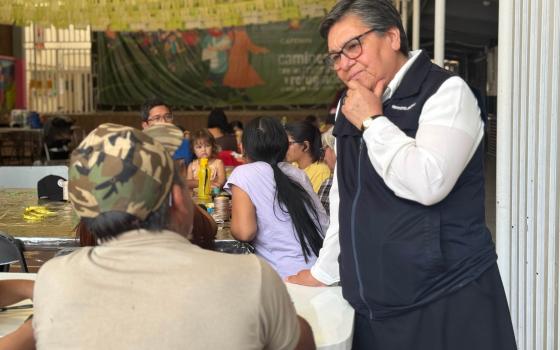
Gmelina arborea trees: I often say, "If you must fell a tree, plant two." (Courtesy of Teresa Anyabuike)
As I reflect on the Holy Father's call to care for our common home, the Earth, I realize that we are doing this every day. I live in a community of Sisters of Notre Dame de Namur that takes care of the environment by cultivating food crops and planting trees. This really has been one of our "hobbies." Most of the vegetables we eat come from our gardens and farm. During the dry season my community does irrigation farming to enable us to continue to get fresh green vegetables and crops for food.
We also plant flowers within and around our community in Nigeria to beautify it, and to provide us with fresh air to breathe — clean air that refreshes our lives and the lives of those around us. One of our chapter calls is Care for Our Common Home. This we have taken seriously and challenged everyone else to be practical in caring for the Earth, our common home.

I live in a community that takes care of the environment by cultivating food crops and planting trees. (Courtesy of Teresa Anyabuike)
I have made it a point of urgency to speak to people about it by engaging them in making concerted efforts to plant more trees, reduce water wastage, and keep the environment clean.
Some people don't see the need for preserving the Earth, but after we discuss what is going on around us — air pollution, lack of rain for farmers to grow their crops, and little or no natural food for consumption — they tend to agree with me and promise to act on saving the planet.
It's very difficult sometimes to convince someone who is used to a particular way of life, such as, for example, using firewood and charcoal for cooking. The question they ask me is: "What else do you want us to use, since we don't have money for cooking gas?"
Advertisement
It has been pretty difficult for me to give them an appropriate answer. I simply tell them to keep planting trees to replace the ones they've used and are still using, and remind them that it is from the trees that we get firewood and charcoal.
In spite of our efforts, some people still don't understand the danger of not caring for the Earth. I think they feel their actions have no devastating effect at all. They feel it should be "business as usual" since climate issues are like fairy tales to them.
When I speak to them on care of our common home, they are less concerned than I am. In their imagination, it's not their problem at all. Convincing them is a herculean task, though I continue to give it my best shot.

As we celebrated Earth Day this year, I felt sad, as I am still seeing people felling trees as part of their business, without replanting any. (Courtesy of Teresa Anyabuike)
The practice of felling trees to create space for planting food crops concerns me because they don't replace the trees cut down. I advocate strongly for more trees to be planted, if one must cut any tree for any reason. I often say, "If you must fell a tree, plant two." In this way, there will be more trees to give us fresh air and good health. Then we will be participating in caring for our common home, the Earth, which is the only planet we have.
As we celebrated Earth Day this year, I felt sad, as I am still seeing people felling trees as part of their business, without replanting any. It breaks my heart. Recently, a Gmelina arborea tree was cut down close to where I live; it was sawed for planks and firewood, and there was no plan for replanting. The tree had been there for more than 20 years.
I couldn't imagine why the tree was cut down. I didn't see that the tree was any hindrance to its surroundings. When I asked those involved if another tree was planted in place of the one cut, the answer was no. I couldn't comprehend it.

Some farmers feel burning is the easiest way to clear the farm for planting. (Courtesy of Teresa Anyabuike)
I feel my sisters and I still have more work to be done in sensitizing the people on the danger of cutting trees without replanting.
One other disturbing thing for me is the burning of bushes, especially during planting season. Some farmers feel it's the easiest way to clear the farm for planting. I spoke to a farmer who told me how expensive it is to clear her farm land for planting, and explained that is why she chose to burn it.
I told her that burning might seem cheaper to her, but the long-term effect on the land is devastating — that plants and animals are destroyed when you burn those bushes to plant food crops.
I earnestly hope everyone will understand that climate change is at our door, and that urgent proactive measures need to be taken to care for our common home.








